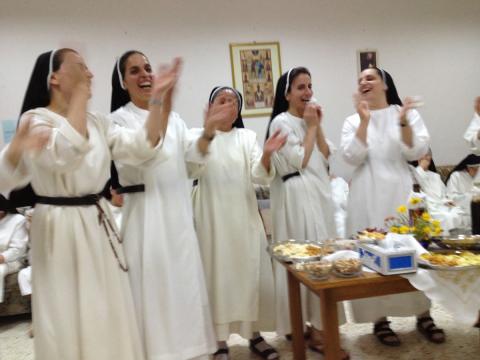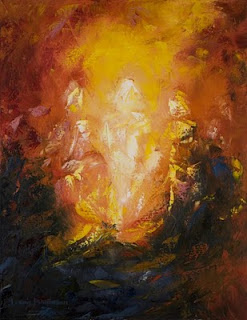 |
| Dominican Sisters in Happier Days (2013) |
August 23rd 2014
Dear all,
We continue to share our daily struggle with you, hoping that our cry will
reach the world. We are like the blind man of Jericho (Mark 10: 46-52), who had
nothing to express himself, but his voice, asking Jesus for mercy. Although some
people ignored his voice, others listened, and helped him. We count on people,
who will listen!
We entered the third week of displacement. Things are moving very slowly in
terms of providing shelter, food, and necessities for the people. There are
still people living in the streets. There are still no organized camps outside
of schools that are used as refugee centres. An unfinished, three story building
has also been used as a refugee centre. For privacy reasons, families have made
rooms using UNHCR plastic sheets in these unfinished buildings. These places
look like stables. We all wonder, is there any end in sight? We appreciate all
efforts that have been made to provide aid to the displaced people. However,
please note, that providing food and shelter is not the only essential thing we
need. Our case is much bigger. We are speaking about two minorities (Christian
and Yezedians), who lost their land, their homes, their belongings, their jobs,
their money, some have been separated from their families and loved ones, and
all are persecuted because of their religion.
Our church leaders are doing their best to solve the issue. They have been
meeting with political leaders, with the President of Iraq and Kurdistan, but
initiatives and actions of these political leaders are really slow and modest.
Actually, all political meetings have led to nothing. Until now, there has been
no decision made about the current situation of the displaced minorities. For
this reason, trust in the political leaders has diminished, if it exists, at
all. People cannot tolerate it anymore. It is too heavy of a burden. Yesterday,
a young man expressed that he would rather die than live, without dignity.
People feel that their dignity has been stripped from them. We are being
persecuted because of our religion. None of us ever thought we would live in
refugee camps because of that.
It is hard to believe that this is happening in the 21st
century. We wonder what is exactly happening. Is it another plan or agreement to
subdivide Iraq? If this is true, by whom and why? Why are the events of dividing
the Middle East, that happened in 1916, being repeated now? At that time it was
a political issue and innocent people paid for it. It is apparent that there are
sinfully, cunning people dividing Iraq, now. In 1916, we lost seven of our
sisters, many Christians died, and more were scattered. Is it just circumstance
we face this division again, or is it deliberate?
However, the struggle is not only in the camps, with the displaced people.
What has happened in our Christian towns that have been evacuated is even worse.
The IS forced out of their homes those who did not leave their towns up to the
night of August 6th. Yesterday, seventy-two people were driven out of
Karakosh. However, not all of them arrived; those who arrived last night were in
miserable condition. They had to cross Al-Khazi river (a tributary to the Great
Zab) on foot because the bridge had been destroyed. There are still quite few on
the side of the riverbank. We do not know when they will make it to Erbil. It
depends on the situation and negotiations between the Peshmerga and the IS.
There are some people who went to fetch the elderly and the unable to walk. One
of our sisters went to bring her parents, and told her story. Another woman,
said that she was separated from her husband and children, and she knows nothing
about them; they are probably among the others who are on the other bank, or
they might be among the hostages taken by the IS. Also, a three-year old daughter
was taken from her mother’s lap, and she also knows nothing about her. We do not
know why the IS are sending people out of Karakosh, but we have been hearing
from those who just arrived, that IS are bringing barrels into Karakosh and the
contents are unknown.
In addition, we know of four Christian families who are stuck in Sinjar for
over three weeks; they are probably running out of food and water. If they do
not get help, they will die there. At the present, there is no contact with
them, and there is no way to negotiate with the IS.
As for our community, we know that our convent in Tel Kaif is being used as
an IS headquarter. Also, we know that they had entered our convent in Karakosh.
Those that recently arrived have stated that all the holy pictures, icons, and
statutes are being destroyed. Crosses have been taken off the top of churches
and they have been replaced with the IS flags. That is not only in Karakosh and
Tel Kaif. In Baqofa, one of our sisters heard the situation was calm, so she
went back with few people, to get her medicine. She found the convent had been
searched; everything was open and strewn across the rooms. The minute they
entered the convent, three bombs hit the town. They left immediately.
Apart from what is happening to the Christians, yesterday, Friday the
22nd, a Shiite suicide bomber and gunmen attacked Sunni mosque of
Abou Mussab in village under Iraqi government control in Diyala province leaving
68 dead. It is heartbreaking to hear about people get killed while praying. In
terms of Media and news release, this massacre overshadowed what is happening to
the Christians in Nineveh Plain. We are afraid that our struggle will become
only our own affairs, and it will not have impact on the world anymore.
At last, we have to say that people are losing their patience. They miss
everything in their hometowns: churches, church bells, streets, and
neighborhood. It is heartbreaking for them to hear that their homes have been
robbed. Although they love their towns, most people are now thinking of leaving
the country so they can live in dignity and have future for their children. It
is heard to have hope in Iraq, or to trust the leadership of the country.
Please, keep us in your prayers.
Dominican Sisters of Saint Catherine of Siena-Iraq
P.S. Please share the letter with other people. Let the world hear the cry
of the poor and the innocent.




































































